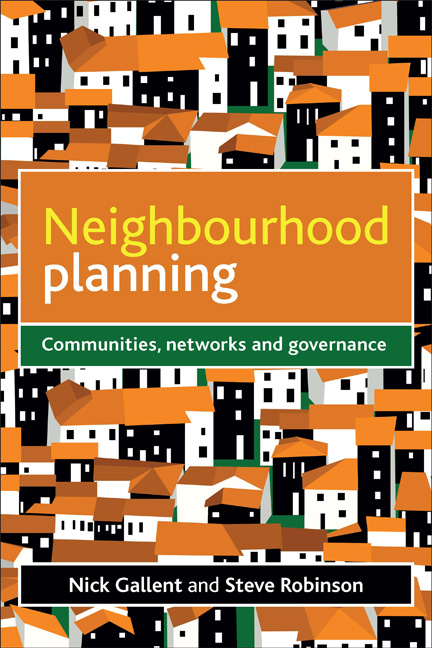Book contents
- Frontmatter
- Dedication
- Contents
- List of figures, images and table
- Abbreviations
- Acknowledgements
- Authors’ note
- Part One Democracy, planning and localism
- Part Two Capacity building and community-based planning
- Part Three The interface with policy actors
- Part Four Neighbourhood planning, leadership and democratic renewal
- References
- Index
twelve - Community-based plans
Published online by Cambridge University Press: 07 September 2022
- Frontmatter
- Dedication
- Contents
- List of figures, images and table
- Abbreviations
- Acknowledgements
- Authors’ note
- Part One Democracy, planning and localism
- Part Two Capacity building and community-based planning
- Part Three The interface with policy actors
- Part Four Neighbourhood planning, leadership and democratic renewal
- References
- Index
Summary
It is through the production of plans and statements that communities may seek to shape not only individual decisions but also the policies on which those decisions are built. Plans articulate a community’s aspirations. Their production can be viewed as an exercise in channelling local energies, and as key to capacity building. But it can also be seen as an overt attempt to supply evidence to stakeholders in the hope that this evidence will influence the shape of policy. This chapter examines community and policy actor views on community-based plans, their value and role in the planning process, and lessons for future evolution. It begins by looking at the interest that these plans have generated and perceptions of the weight they have been given in policy development, before examining actual use and utility. It ends by teasing out lessons for future community-based planning, linking these lessons to neighbourhood development plans in England, introduced in Chapter Four.
The value and ‘weight’ of community-based plans
Parish plans
The weight given to community plans in policy development in England, and also their value within a community relative to their value beyond it, have been topics of major concern among commentators. It has also been suggested that community-based plans should not be viewed as ‘planning’ documents per se, but as markers for community aspiration and need; there to potentially inform the programmes and investments of multiple service providers. Communities themselves acknowledge the aspirational nature of their plans, their variable style and content and the limited data on which they are often constructed. They understand that these plans may not provide policy making with a strong foundation. However, a belief in the broader value of community-based plans generates great enthusiasm for their production. Many parish groups believe that by articulating what is important to the community, and what might potentially upset it, they are setting out a position that politicians will want to take note of. Three of the parishes – Great Chart with Singleton, Bilsington and Appledore – noted that while the production of plans was encouraged by their ward members, planners were generally uninterested in the process. Plans helped in the forming of political agendas, but were viewed as less helpful for planning.
- Type
- Chapter
- Information
- Neighbourhood PlanningCommunities, Networks and Governance, pp. 149 - 162Publisher: Bristol University PressPrint publication year: 2012



